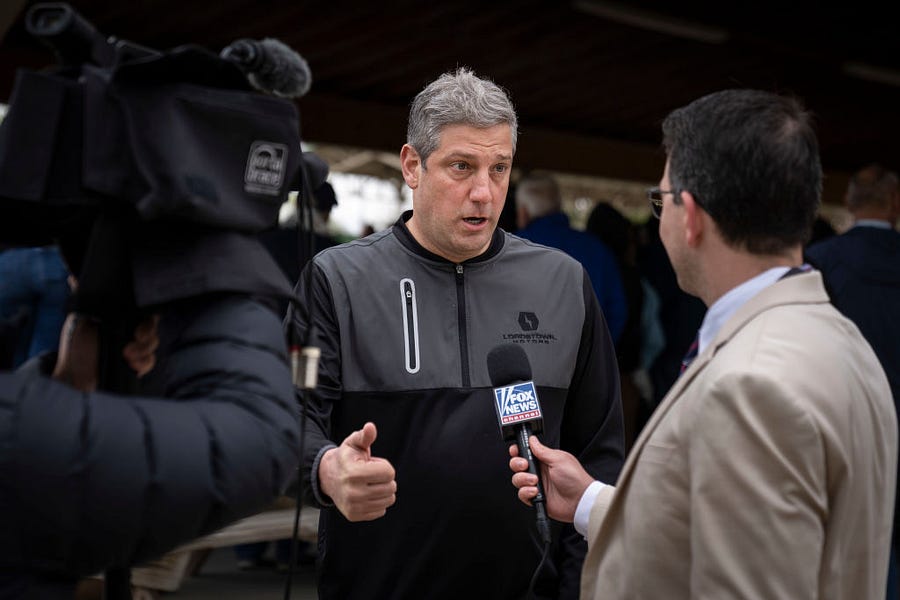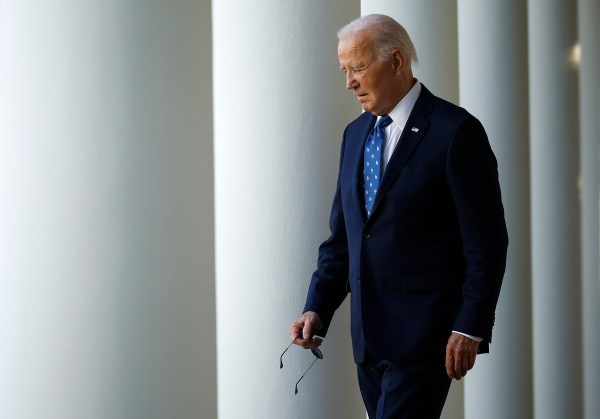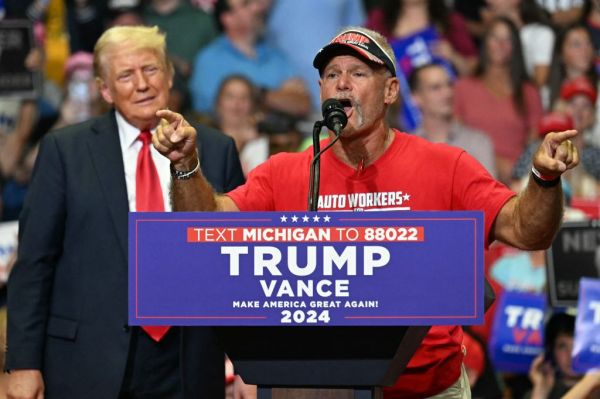On a sunny Tuesday afternoon, a calm and collected Democratic Rep. Tim Ryan strolled down the steps of the U.S. Capitol with an air of confidence atypical for a Democrat running for Senate in a red-learning state. To his credit, Ryan was having an especially good go of things in mid-July, having spent the last few weeks leading Republican opponent J.D. Vance in polls by a comfortable margin.
But that margin was still slim enough to require a keen awareness of any variables that might flip the script come November. Chief among those variables is President Joe Biden’s historically low approval rating. “I’ve disagreed with the president enough for people to know how—to know that where he’s helping Ohio, I’ll help him, and if he’s doing something against Ohio, I’ll be against him,” Ryan said in a July 19 interview, days after he declined to join Biden during his visit to Cleveland.
Unlike most vulnerable Democrats who dodge questions about whether they hope Biden will join them on the campaign trail, Ryan makes it clear in his conversations with reporters that there’s virtually no upside to involving the president in his Senate race. “I really don’t want anyone to join me—like, this is my race,” Ryan told The Dispatch. “We’re not really asking too many people to come in.”
But as in-cycle Democrats continue to adapt to a series of unforeseen political developments ahead of November—a surprising abortion vote in Kansas, the Senate’s passage of the Inflation Reduction Act, or the FBI’s raid on former President Donald Trump’s home—there are two considerations that seem unlikely to change dramatically in the foreseeable future: sky-high inflation, and the uncomfortable reality that Biden’s favorability continues to hover below 40 percent.
The White House is optimistic that Biden’s most recent legislative successes will translate to electoral successes on the ballot this fall. “Do I expect it to help? Yes, I do,” Biden said on Monday of his soon-to-be passed domestic policy bill, which aims to lower the cost of prescription drugs and invest billions into clean energy programs, among other measures.
But it remains unclear whether passage of the Inflation Reduction Act will make a difference in Biden’s historically low approval rating at this point in the midterm cycle. Polling conducted in recent weeks suggests it’s not just Republicans who are unhappy with the way things are going under the Biden administration. Dissatisfaction with the president is so pronounced among members of his own party that only a quarter of registered Democratic voters want him to be the party’s presidential nominee in 2024, according to a recent New York Times/Siena College survey conducted last month.
All the while, a new Monmouth poll released last week shows congressional Democrats are somehow leading their Republican counterparts in the generic ballot by 7 points, a surprising margin that is prompting questions about why Biden lags so far behind.
Some Democrats walk this tightrope by suggesting that the time is ripe for Biden—who will turn 80 this year—to pass the torch to a younger generation of leaders. “I think the country would be well-served by a new generation of compelling, well-prepared, dynamic Democrats who step up,” Democratic Rep. Dean Phillips told local Minnesota radio station WCCO-AM late last month. Asked a similar question last week, fellow Minnesota Democrat Angie Craig said she agrees that the party needs a “new generation” of Democratic leaders “up and down the ballot.”
Addressing the emerging speculation about Biden’s political future is especially uncomfortable for high-profile Democrats who have known Biden for decades. Take last week’s primary debate in New York’s redrawn 12th District, where Democratic Reps. Jerry Nadler and Carolyn Maloney offered drastically different responses to a question about whether Biden ought to run for a second term in 2024.
“Too early to say,” said Nadler.
“I don’t believe he’s running for re-election,” said Maloney, who seemed taken aback by the question.
Maloney has since walked back her nonanswer in public statements and went so far as to apologize to the president on national television for giving the impression that she wouldn’t support his prospective reelection campaign. “Mr. President I apologize—I want you to run, I happen to think you won’t be running, but when you run or if you run I will be there 100 percent,” she said on CNN last week.
But her instincts speak to the awkward reality that Biden’s historic unfavorability is weighing on Democrats this cycle. Like Maloney, Democratic Sen. Michael Bennet of Colorado made clear his loyalty to the president will translate into the 2024 presidential nominating cycle if Biden decides to run.
“I am grateful beyond measure that he ran the last time because he was the only person who has 330 million Americans who could beat Donald Trump and he did beat Donald Trump,” Bennet said in a brief interview in the U.S. Capitol last Thursday. “He said that he’s intending to run and if he does run, I think he’ll beat Donald Trump again.” But his aides brushed aside a question about whether he hopes Biden will join him on the campaign trail, telling The Dispatch he was “running late” to wherever they were headed.
Other blue-state Democrats running surprisingly competitive reelection campaigns this cycle are focusing their criticisms of Biden on particular policy areas, like inflation, which reached a year-over-year rate of 9.2 percent in June. Even if those numbers ticked down in July—Bureau of Labor Statistics’ July report is expected today—Democratic incumbents will likely still have to explain to their constituents why gas and grocery bills are so high when Democrats control both Congress and the White House.
“I’ve been very clear that I thought that the Biden administration needed to react more quickly to inflation,” Democratic Sen. Maggie Hassan of New Hampshire said in an interview with The Dispatch late last month, though she seemed open to a prospective appearance from Biden on the campaign trail. “The president is always welcome in my state.”
Meanwhile, most high-profile Democrats who aren’t on the ballot this cycle have in recent weeks refused to even entertain the notion that Biden’s favorability numbers are a top concern for their in-cycle colleagues. “As an elected person, you think I’m going to spend that much time relying on polls? If I did that, I probably wouldn’t even be here talking to you,” Democratic Sen. Mazie Hirono of Hawaii said in a brief interview with The Dispatch last month.
Democratic Sen. Elizabeth Warren of Massachusetts also said as much in a mid-July interview: “I haven’t seen the polls, and frankly I don’t much care about them.”









Please note that we at The Dispatch hold ourselves, our work, and our commenters to a higher standard than other places on the internet. We welcome comments that foster genuine debate or discussion—including comments critical of us or our work—but responses that include ad hominem attacks on fellow Dispatch members or are intended to stoke fear and anger may be moderated.
You are currently using a limited time guest pass and do not have access to commenting. Consider subscribing to join the conversation.
With your membership, you only have the ability to comment on The Morning Dispatch articles. Consider upgrading to join the conversation everywhere.